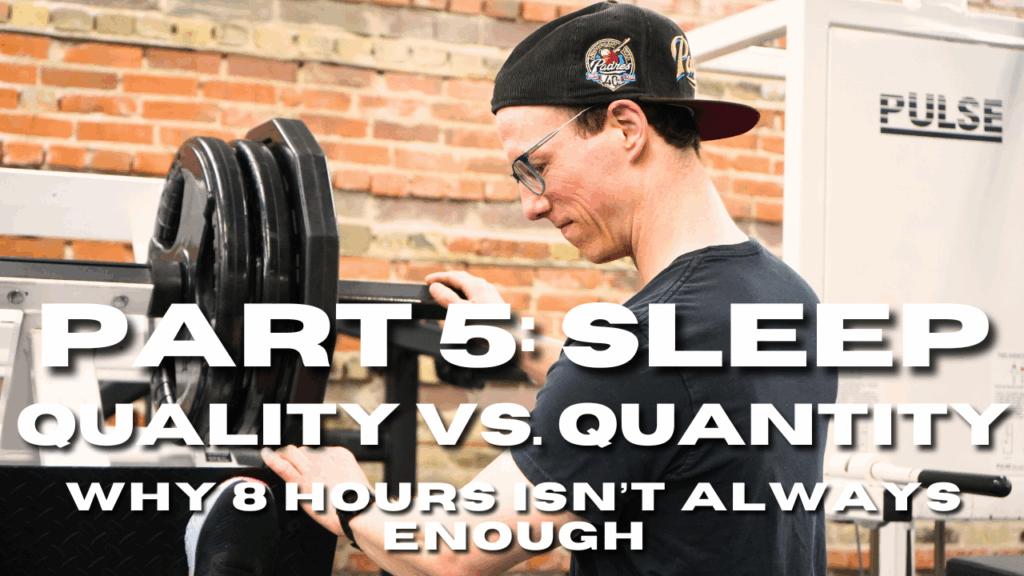
We’ve all heard the golden rule: get 8 hours of sleep. But what if you hit that number and still wake up tired, sore, or sluggish in your workouts? That’s where sleep quality enters the conversation. It’s not just how long you sleep — it’s how well you sleep that drives real recovery and performance.
Sleep Architecture 101
Your nightly sleep isn’t one long, uninterrupted slumber — it’s made up of cycles that repeat roughly every 90 minutes. Each cycle includes multiple stages:
- Stage 1: Light sleep — transition between wakefulness and sleep.
- Stage 2: Deeper light sleep — heart rate and temperature drop.
- Stage 3 (Slow-Wave Sleep): The deepest, most restorative sleep — where muscle repair, growth hormone release, and physical recovery peak.
- REM Sleep: Brain activity spikes — memory consolidation, learning, and emotional processing occur here.
The goal isn’t just clocking hours in bed — it’s completing multiple full cycles with adequate time in both deep and REM sleep. Poor sleep quality disrupts this rhythm, especially if you’re waking up frequently, dealing with light pollution, or consuming caffeine or alcohol too close to bedtime.
What Impacts Sleep Quality?
Even if you think you’re getting enough sleep, these hidden culprits may be interfering with your sleep architecture:
- Blue light from screens disrupts melatonin, the hormone that cues your body to wind down.
- Late-night eating or alcohol can fragment sleep and reduce time in deep sleep stages.
- Chronic stress elevates cortisol, which delays sleep onset and shortens REM duration.
- Inconsistent sleep and wake times confuse your circadian rhythm — your body’s internal clock — and reduce sleep efficiency.
Signs Your Sleep Quality Might Be Lacking
- You sleep 7–9 hours but wake up groggy or with brain fog.
- You’re sore longer than usual after workouts.
- You experience mood swings, irritability, or low motivation.
- Your training progress stalls despite consistent workouts and good nutrition.
The Athletic Sleep Sweet Spot
Elite athletes are increasingly being coached on sleep hygiene as part of their training regimen — and regular gym-goers should take note. Research by Mah et al. (2011) on Stanford basketball players showed that extending sleep beyond normal levels (to about 10 hours per night) improved sprint times, shooting accuracy, and daytime alertness.
What does this mean for the everyday lifter? Sometimes, it’s not just about avoiding too little sleep — it’s about optimizing sleep depth and continuity. You might benefit from:
- Sleeping slightly longer during heavy training cycles
- Improving bedroom environment (cool, dark, and quiet)
- Tracking sleep stages with a wearable to monitor trends over time
What the Research Says
A 2019 review in Nature and Science of Sleep emphasized that sleep fragmentation (frequent waking) can impair recovery more than total sleep time alone. Poor sleep quality is also linked to impaired glucose metabolism, reduced endurance, and increased perception of effort during training (Reynolds & Banks, 2010).
In other words, you might be “sleeping enough,” but still not recovering well — and that’s a critical distinction for performance-minded individuals.
Practical Strategies to Upgrade Sleep Quality
- Set a wind-down routine: Same time every night, no screens an hour before bed.
- Get sunlight exposure during the day — it helps reset your circadian rhythm.
- Cut off caffeine at least 6 hours before bed.
- Use a sleep tracker (if helpful) to monitor consistency and patterns, not just hours.
- Keep your room cool (around 65°F/18°C) and eliminate unnecessary light sources.
Takeaways for White Lion Strong Members
- Don’t just count hours — track how rested you feel.
- Quality sleep means better hormone balance, recovery, and mental sharpness.
- Sleep disruptions — even small ones — can blunt progress in strength and physique.
- Build a nighttime ritual that primes you for deep, restorative sleep.
References
Mah, C. D., Mah, K. E., Kezirian, E. J., & Dement, W. C. (2011). The effects of sleep extension on the athletic performance of collegiate basketball players. Sleep, 34(7), 943–950. https://doi.org/10.5665/SLEEP.1132
Reynolds, A. C., & Banks, S. (2010). Total sleep deprivation, chronic sleep restriction and sleep disruption. Progress in Brain Research, 185, 91–103. https://doi.org/10.1016/B978-0-444-53702-7.00006-3